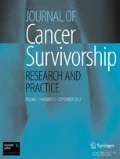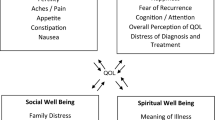Abstract
Introduction
Most studies on quality of life of breast cancer survivors have not had adequate representation of ethnic minorities. The purpose of this study was to determine whether racial/ethnic differences in quality of life exist between white, African American, and Latina women in the early stages of survivorship.
Methods
2268 women were identified by two Surveillance, Epidemiology and End Results (SEER) registries (6/05–2/07) and asked to complete a survey (mean 9 months post-diagnosis, 72.1% response rate). Latina and African American women were over-sampled. Regression models compared quality of life across race/ethnicity (white, African American, Latina [low vs. high acculturation]), sequentially controlling for sociodemographics, clinical, and treatment factors.
Results
There were significant racial/ethnic differences in quality of life controlling for sociodemographics, clinical factors and treatment factors. Lower acculturated Latinas compared to whites had significantly lower functional well-being, emotional well-being, and breast cancer concerns (p values < 0.05). African Americans had significantly higher emotional well-being than whites. Age, co-morbidities, cancer stage, and chemotherapy also influenced quality of life. A significant interaction was found between race/ethnicity and age for physical well-being (p = 0.041) and for emotional well-being (p = 0.042). Specifically, racial/ethnic differences were only observed among older women (≥50 years), with less acculturated Latinas reporting the lowest quality of life.
Conclusions
Racial/ethnic differences in quality of life exist during the cancer survivorship period. Latinas with low acculturation are a particularly vulnerable subgroup.
Implications
Greater attention should be devoted to identifying women disproportionately affected by breast cancer and developing interventions targeting their unique survivorship concerns.


Similar content being viewed by others
References
Smedley BD, Stith A, Nelson AR. Unequal treatment: confronting racial and ethnic disparities in health care. Washington, DC Institute of Medicine: The National Academy Press; 2003.
US Department of Health and Human Services, Nation Institutes of Health, National Cancer Institute. Living beyond cancer: Finding a new balance. President’s Cancer Panel: 2003–2004 Annual Report. Washington, D.C.; 2004.
Hewitt M, Greenfield S, Stovall E. Cancer patient to cancer survivor: lost in transition. Washington: The National Academy Press; 2006.
Bloom JR, Steward SL, Chang S, Banks P. Then and now: quality of life of young breast cancer survivors. Psycho-Oncology. 2004;13:147–60.
Costanzo ES, Lutgendorf SK, Mattes ML, Trehan S, Robinson CB, Tewfik F, et al. Adjusting to life after treatment: distress and quality of life following treatment for breast cancer. Br J Cancer. 2007;97(12):1625–31.
Cotton SP, Levine EG, Fitzpatrick CM, Dold KH, Targ E. Exploring the relationships among spiritual well-being, quality of life, and psychological adjustment in women with breast cancer. Psycho-oncology. 1999;8(5):429–38.
Friedman LC, Kalidas M, Elledge R, Chang J, Romero C, Husain I, et al. Optimism, social support and psychosocial functioning among women with breast cancer. Psycho-oncology. 2006;15(7):595–603.
Ganz PA, Desmond KA, Leedham B, Rowland JH, Meyerowitz BE, Belin T. Quality of life in long term disease free survivors of breast cancer: a follow-up study. J Natl Cancer Inst. 2002;94:39–49.
Ganz PA, Guadagnoli E, Landrum MB, Lash TL, Rakowski W, Silliman RA. Breast cancer in older women: quality of life and psychosocial adjustment in the 15 months after diagnosis. J Clin Oncol. 2003;21:4027–33.
Janz NK, Mujahid MS, Hawley ST, Griggs JJ, Hamilton AS, Katz SJ. Racial/ethnic differences in adequacy of information and support for women with breast cancer. Cancer. 2008;113:1058–67.
Pollack L, Greer GE, Rowland JH, Miller A, Doneski D, Coughlin SS, et al. Cancer survivorship: a new challenge in comprehensive cancer control. Cancer Causes Control. 2005;16:51–9.
Trentham-Dietz A, Sprague BL, Klein R, Klein BE, Cruickshanks KJ, Fryback DG, et al. Health-related quality of life before and after breast cancer diagnosis. Breast Cancer Res Treat. 2007: E-pub ahead of print.
Ashing-Giwa KT, Padilla GV, Bohorquez DE, Tejero JS, Garcia M. Understanding the breast cancer experience of Latina women. J Psychosoc-Oncol. 2006;24:19–52.
Garofalo JP, Hammann HA, Ashworth K, Baum A. Stress and quality of life in African American breast cancer survivors. Ethn Dis. 2006;16:732–8.
Powe B, Hamilton J, Hancock N, Johnson N, Finnie R, Ko J, et al. Quality of life of African American cancer survivors. Cancer. 2007;109:435–45.
Katz SJ, Lantz PM, Paredes Y, Janz NK, Fagerlin A, Liu L, et al. Breast cancer treatment experiences of Latinas in Los Angeles County. Am J Public Health. 2005;95:2225–30.
Ayanian JZ, Jacobsen PB. Enhancing research on cancer survivors. J Clin Oncol. 2006;24:5149–53.
Fatone AM, Moadel AB, Foley FW, Fleming M, Jandorf L. Urban voices: the quality-of-life experience among women of color with breast cancer. Palliat Support Care. 2007;5:115–25.
Gil KM, Mishel MH, Belyea M, Germino B, Porter LS, Carlton Laney I, et al. Triggers of uncertainty about recurrence and long-term treatment side effects in older African American and Caucasian breast cancer survivors. Oncol Nurs Forum. 2004;31:633–9.
Ashing-Giwa K, Tejero JS, Kim J, Padilla GV, Hellemann G. Examining predictive models of HRQOL in a population-based, multiethnic sample of women with breast carcinoma. Qual Life Res. 2007;16:413–28.
Bowen DJ, Alfano CM, McGregor BA, Kuniyuki A, Bernstein L, Meeske K, et al. Possible socioeconomic and ethnic disparities in quality of life in a cohort of breast cancer survivors. Breast Cancer Res Treat. 2007;106:85–95.
Ashing-Giwa K. Quality of life of African-American and white long term breast carcinoma. Cancer. 1999;85:418–26.
Northouse LL, Caffey M, Deichelbohrer L, Schmidt L, Guziatek-Trojniak L, West S, et al. The quality of life of African American women with breast cancer. Res Nurs Health. 1999;22:449–60.
Rao D, Debb S, Blitz D, Choi SW, Cella D. Racial/ethnic differences in the health-related quality of life of cancer patients. J Pain Symptom Manage. 2008;36:488–96.
Culver JL, Arena PL, Antoni MH, Carver CS. Coping and distress among women under treatment for early stage breast cancer: Comparing African Americans, Hispanics, and non-Hispanic Whites. Psycho-Oncology. 2002;11:495–504.
Spencer SM, Lehman JM, Wynings C, Arena P, Carver CS, Antoni MH, et al. Concerns about breast cancer and relations to psychosocial well-being in a multiethnic sample of early-stage patients. Health Psychol. 1999;18:159–68.
Baker F, Denniston M, Smith T, West MM. Adult cancer survivors: how are they faring? Cancer. 2005;104:2565–76.
Kornblith AB, Powell M, Regan MM, Bennett S, Krasner C, Moy B, et al. Long-term psychosocial adjustment of older vs. younger survivors of breast and endometrial cancer. Psycho-oncology. 2007;16:895–903.
Giedzinska AS, Meyerowitz BE, Ganz PA, Rowland JH. Health-related quality of life in a multiethnic sample of breast cancer survivors. Ann Behav Med. 2004;28:39–51.
Janz NK, Mujahid MS, Lantz PM, Fagerlin A, Salem B, Morrow M, et al. Population-based study of the relationship of treatment and sociodemographics on quality of life for early stage breast cancer. Qual Life Res. 2005;14:1467–79.
Engel J, Kerr J, Schlesinger-Raab A, Eckel R, Sauer H, Holzel D. Predictors of quality of life of breast cancer patients. Acta Oncol. 2003;42:710–8.
Greene FL, Page DL, Fleming ID, Fritz A, Balch CM. AJCC cancer staging manual. 6th ed. Philadelphia: Lippincott Raven Publishers; 2002.
Ahles TA, Saykin AJ, Furstenberg CT, Cole B, Mott LA, Titus-Ernstoff L, et al. Quality of life of long-term survivors of breast cancer and lymphoma treated with standard-dose chemotherapy or local therapy. J Clin Oncol. 2005;23:4399–405.
Moore RJ, Butow P. Culture and oncology: impact of context effects. New York: Kluwer; 2004.
Aziz NM, Rowland JH. Cancer survivorship research among ethnic minority and medically Underserved groups. Oncol Nurs Forum. 2002;29:789–801.
Marin G, Van Oss Marin B. Research with Hispanic populations. Applied Social Research Methods Series, issue number 23, Sage Publications, Newbury Park, CA, 1991.
Dillman DA. Mail and telephone surveys: the total design method. New York: Wiley; 1997.
Cella D, Tulsky D, Gray G. The functional assessment of cancer therapy scale: development and validation of the general measure. J Clin Oncol. 1993;11:570–9.
Brady M, Cella D, Mo F, Bonomi AE, Tulsky DS, Lloyd SR, et al. Reliability and validity of the functional assessment of cancer therapy-breast quality-of-life instrument. J Clin Oncol. 1997;15:974–86.
Bradley CJ, Neumark D, Luo Z, Schenk M. Employment and cancer: findings from a longitudinal study of breast and prostate cancer survivors. Cancer Invest. 2007;25:47–54.
Bradley CJ, Given CW, Roberts C. Disparities in cancer diagnosis and survival. Cancer. 2001;91:178–88.
Lantz PM, Mujahid M, Schwartz K, Janz NK, Fagerlin A, Salem B, et al. The influence of race, ethnicity and individual socioeconomic factors of breast cancer stage at diagnosis. Am J Public Health. 2006;96:2173–8.
Arora NK, Johnson P, Gustafson DH, McTavish F, Hawkins RP, Pingree S. Barriers to information access, perceived health competence, and psychosocial health outcomes: test of a mediation model in a breast cancer sample. Patient Educ Couns. 2002;47:37–46.
Griggs JJ, Sorbero ME, Mallinger JB, Quinn M, Waterman M, Brooks B, et al. Vitality, mental health, and satisfaction with information after breast cancer. Patient Educ Couns. 2007;66:58–66.
Hawley ST, Janz NK, Hamilton A, Griggs JJ, Alderman AK, Mujahid M, et al. Latina patient perspectives about informed treatment decision making for breast cancer. Patient Educ Couns. 2008;73:363–70.
Sammarco A, Konecny LM. Quality of life, social support, and uncertainty among Latina breast cancer survivors. Oncol Nurs Forum. 2008;35(5):844–9.
Lim J, Yi J, Zebrack B. Acculturation, social support, and quality of life for Korean immigrant breast and gynecological cancer survivors. Ethn Health. 2008;13(3):243–60.
Ashing-Giwa K, Padilla GV, Tejero JS, Kim J. Breast cancer survivorship in a multiethnic sample. Cancer. 2004;101:450–65.
Wildes KA, Miller AR, San Miguel de Majors S, Ramirez AG. The religiosity/spirituality of Latina breast cancer survivors and influence on health-related quality of life. Psycho-Oncology. 2008: Epub ahead of print.
Krause N, Batida E. Religion, suffering, and health among older Mexican Americans. J Aging Stud. 2009;23:114–23.
Stephens C, Stein K, Landrine H. The role of acculturation in life satisfaction among Hispanic cancer survivors: results of the American Cancer Society’s study of cancer survivors. Psycho-Oncology. 2009:Epub ahead of print.
Porter LS, Clayton MF, Belyea M, Mishel MH, Gil KM, Germino B. Predicting negative mood state and personal growth in African American and White long term breast cancer survivors. Ann Behav Med. 2006;31(3):195–204.
Acknowledgements
This work was funded by grants R01 CA109696 and R01 CA088370 from the National Cancer Institute (NCI) to the University of Michigan. Dr. Katz was supported by an Established Investigator Award in Cancer Prevention, Control, Behavioral, and Population Sciences Research from the NCI (K05CA111340).
The collection of Los Angeles County cancer incidence data used in this study was supported by the California Department of Public Health as part of the statewide cancer reporting program mandated by California Health and Safety Code Section 103885; the NCI’s Surveillance, Epidemiology and End Results (SEER) Program under contract N01-PC-35139 awarded to the University of Southern California, contract N01-PC-54404 awarded to the Public Health Institute; and the Centers for Disease Control and Prevention’s National Program of Cancer Registries, under agreement 1U58DP00807-01 awarded to the Public Health Institute. The collection of metropolitan Detroit cancer incidence data was supported by the NCI SEER Program contract N01-PC-35145. The ideas and opinions expressed herein are those of the author(s) and endorsement by the State of California, Department of Public Health the National Cancer Institute, and the Centers for Disease Control and Prevention or their Contractors and Subcontractors is not intended nor should be inferred.
Special thanks to Ain Boone, Cathey Boyer, and Deborah Wilson for their data collection efforts at the Metropolitan Detroit Cancer Surveillance System (MDCSS) and to Alma Acosta, Marlene Caldera, Norma Caldera, Maria Isabel Gaeta, Urduja Trinidad, and Mary Lo at the Cancer Surveillance Program in Los Angeles; and to Barbara Salem, Ashley Gay and Paul Abrahamse at the University of Michigan.
Author information
Authors and Affiliations
Corresponding author
Rights and permissions
About this article
Cite this article
Janz, N.K., Mujahid, M.S., Hawley, S.T. et al. Racial/ethnic differences in quality of life after diagnosis of breast cancer. J Cancer Surviv 3, 212–222 (2009). https://doi.org/10.1007/s11764-009-0097-y
Received:
Accepted:
Published:
Issue Date:
DOI: https://doi.org/10.1007/s11764-009-0097-y




